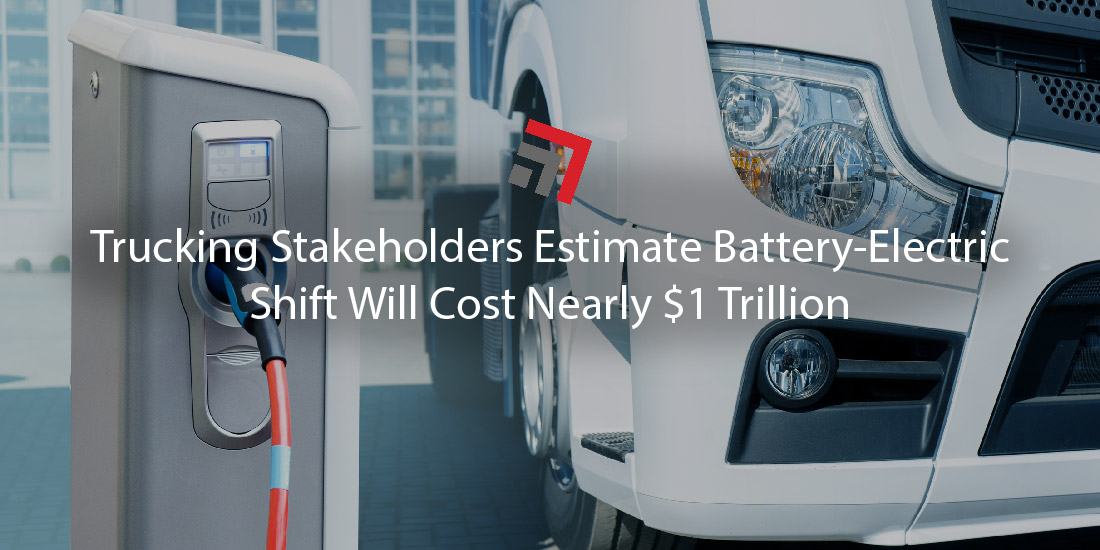The idea of envisioning a decarbonized trucking industry may be free but making it a nationwide reality will require intimidating investments, reconceived infrastructure, and uneasy alliances. While those requisites are expected by even the staunchest of advocates, a consortium of trucking stakeholders claims this ambitious venture will cost a lot more than any proponent has shared.
The Clean Freight Coalition (CFC), whose members include the American Trucking Associations, motor carriers, truck dealers, and truck stop operators, allege that the accelerated push from President Joe Biden’s administration to decarbonize the industry will cost nearly $1 trillion.
Charging infrastructure would cost trucking $620 billion, study finds
Typically, when the trillion unit is thrown around, many people will think of it as an exaggeration. However, the CFC did not come up with such a seemingly far-fetched figure in an attempt to be zingy. Rather, the group bases the near 12-zeroes sum on a study it commissioned, released earlier in the week. The summary of the findings concluded two major costs—one of which directly impacts trucking’s pocketbook.
The trucking industry would have to invest $620 billion into charging infrastructure. This includes chargers, site infrastructure, and utility service costs.
The other cost befalls onto utility companies. The study estimates that they would have to invest $370 billion to support a newfound increase in charging demand and upgrades to their power grids. The cost is nearly equal to what has been invested into the U.S. power grid over the past 15 years, the findings added.
Combining the two investments, the total sum nears the $1 trillion mark. That said, absent from the study’s projected expenditures are the costs of new battery-electric trucks, CFC noted.
The upfront purchase of a battery-electric truck is considerably higher than a conventional diesel build. The base price of a Class 8 (heavy-duty) battery electric truck is between $350,000 to $500,000—around three to five times that of a diesel.
Despite the initial cost, proponents of battery-electric technology argue that electricity is cheaper than traditional fuels, including diesel. In other words, trucking companies’ operating costs may decrease in the long run as they could spend less on fuel.
EPA proposal set to accelerate emissions standards, trucking opposes the rulemaking
The CFC presented its commissioned study ahead of the U.S. EPA’s plan to finalize a rule which will accelerate emission standards for commercial trucking. As the proposal currently stands, fleets would be required to significantly cut back on their emissions beginning with the 2027 model year.
The pursuit of this rule dates back to March 2022 when the federal agency introduced it under President Biden’s administration. The goal of these proposed regulations are to reduce heavy-duty truck emissions by 90 percent below present-day standards starting in 2027.
Members of the CFC, as well as other trucking interest groups, have vocally opposed the rule. While not inherently against the decarbonizing their operations, these groups are incensed at the estimated costs emerging from the aggressive timeline. They reason that stakeholders and regulators should collaborate towards a more pragmatic solution to reducing emissions and adopting battery-electric technology industrywide.
In a news release following the study, American Trucking Associations President and CEO Chris Spear stated: “We’re facing an unfunded, $1 trillion mandate…A real-world understanding of the path to our shared goal of zero emissions is needed, but unrealistic times and expectations will break the bank.”
In between the lines of Spear’s comment, and perhaps stated more bluntly in other opposing criticisms, is the concern that the trucking industry itself cannot fully fund the requirements of this accelerated emissions timeline. They imply that outside assistance, mainly the federal government, would be necessary to accomodate these major investments.
Final Thoughts
While it is clear that most stakeholders are at odds with the Biden administration’s timeline, one, albeit not-so-surprising, group has claimed that federal rule is not aggressive enough. The Zero Emission Transportation Association (ZETA), an industry group alliance pushing for 100 percent electric vehicle sales, has encouraged the EPA to finalize stricter emission standards which align with the Advanced Clean Trucks (ACT), a controversial form of state regulation in California. Beginning this year (2024 model year), ACT requires manufacturers to sell zero-emission vehicles as an increasing percent of total truck sales in California. By the end of 2024, 5 to 9 percent of sales will need to be zero-emission trucks.
Automaker Tesla is a notable member of ZETA. The company, which markets battery-electric trucks, previously asked the federal government for $100 million to construct nine electric semi-truck charging stations. Tesla’s request for funding underscores the argument CFC members have made—private initiatives to decarbonize the industry will need federal support if they are to align with the Biden administration’s timeline.
Contact one of our team members if you have any questions regarding this topic or any others in domestic logistics.
More blogs similar to this:



Recent Comments